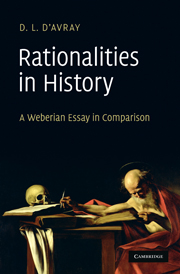Book contents
- Frontmatter
- Contents
- Preface and acknowledgements
- Introduction
- 1 Universal and specific rationalities: theories
- 2 The structure of values and convictions
- 3 Dynamics of values and convictions
- 4 The instrumental–conviction rationality interface
- 5 Formal rationality
- 6 The formal–substantive interface
- Conclusions
- Appendix: rationalities in a case before the Congregation of the Council
- Bibliography
- Index
5 - Formal rationality
Published online by Cambridge University Press: 05 June 2012
- Frontmatter
- Contents
- Preface and acknowledgements
- Introduction
- 1 Universal and specific rationalities: theories
- 2 The structure of values and convictions
- 3 Dynamics of values and convictions
- 4 The instrumental–conviction rationality interface
- 5 Formal rationality
- 6 The formal–substantive interface
- Conclusions
- Appendix: rationalities in a case before the Congregation of the Council
- Bibliography
- Index
Summary
Formal rationality and the law
Here the phrase ‘formal rationality’ is taken to mean ‘decision-making within a set of rules constructed to govern an aspect of life abstracted or demarcated from all other aspects, in such a way that the latter are not allowed to affect the decision-making process’. The distinction between formal and substantive rationality works in various domains. In economic terms it may be formally rational to let an industry or firm go under, but substantive considerations may force the government to subsidise it. The considerations might be humanitarian – the social cost to the workers. They do not have to be value-driven, however: it might be a cynical political calculation that a key constituency would be lost to the party if purely economic judgement prevailed. Or again, a war strategy may make no sense in purely military terms – making it formally irrational – yet it may be rational substantively because it is required by public opinion. Rather than try to keep all these thematic balls in the air simultaneously, however, the remainder of the book will focus on one key area that particularly lends itself to comparative sociological history: law. Furthermore, the comparative history of law provides good data with which to make the central point of this chapter, viz., that formal rationality, which is most often a species of instrumental rationality, is generally shaped by conviction rationality.
- Type
- Chapter
- Information
- Rationalities in HistoryA Weberian Essay in Comparison, pp. 146 - 162Publisher: Cambridge University PressPrint publication year: 2010



